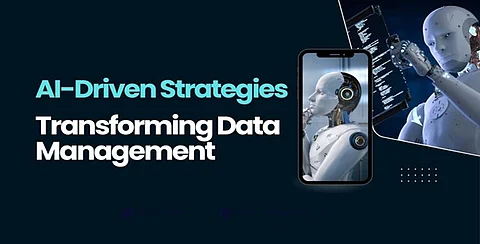

In the evolving landscape of enterprise data management, Babita Kumari has provided an in-depth exploration of how artificial intelligence (AI) is revolutionizing Master Data Management (MDM). Her research focuses on groundbreaking innovations that enhance data governance, operational efficiency, system scalability, and regulatory compliance. By bridging the gap between traditional MDM frameworks and modern technological advancements, her work offers actionable strategies for enterprises navigating the complexities of large-scale data environments.
Traditional MDM systems, dependent on manual interventions and rule-based frameworks, are increasingly inadequate as organizations manage 347.56 terabytes of data across diverse platforms. AI-driven MDM automates operations, reducing data processing time by 85% while improving accuracy and scalability. These systems leverage machine learning for entity resolution, predictive modelling, and anomaly detection, enabling businesses to streamline workflows, reduce overhead, and ensure superior data quality. Additionally, they empower organizations to process data in real-time, aligning operations with evolving business needs efficiently.
A key innovation in AI-driven MDM lies in data matching engines, which achieve 98.5% accuracy in resolving customer records across diverse datasets. These engines process over 1.2 million records daily with sub-millisecond query response times, ensuring seamless integration across systems. Using advanced technologies like deep neural networks, gradient boosting algorithms, and Siamese neural networks for similarity scoring, these solutions adapt dynamically to evolving data patterns, improving accuracy monthly. This continuous learning capability allows organizations to manage growing data complexity effectively, reduce redundancies, and enhance operational efficiency.
AI-powered anomaly detection systems revolutionize data validation and security by utilizing advanced probabilistic models and deep learning algorithms. These systems process 750 terabytes of data daily with a remarkable 99.3% accuracy in detecting inconsistencies and anomalies across datasets. Real-time pattern analysis and contextual detection reduce false positives by 85%, lowering operational costs and minimizing manual intervention. Auto-healing features enable real-time resolution of 60% of anomalies, ensuring uninterrupted system performance and enhancing overall data reliability. This proactive approach helps businesses mitigate risks and maintain compliance in increasingly complex regulatory environments, supporting sustainable and efficient operations.
The combination of natural language processing (NLP) and AI is leading to natural language MDM and represents a transformative change to AI-driven MDM, with complete semantic analysis and entity extraction across multilingual datasets with 97% accuracy. These pipelines enable 95 per cent of business languages spoken around the globe, allowing for uninterrupted and easy global operations. The integration of unstructured data is made easy by real-time translation and normalization tools to enable informed decision-making spanning regions. NLP technologies such as Natural language processing can process up to 10,000 documents per minute and gain insights that are valuable from large textual data to help predictive analytics, customer engagement and strategic planning. They allow you to continue to improve and their approach will always have more and more impact.
By implementing a microservices architecture, AI-driven MDM systems enhance in terms of scalability, flexibility and performance. Dynamic scaling from 5 to 500 pods based on demand is possible using containerized services orchestrated by Kubernetes and then the resource is efficiently allocated. With support for over 100,000 concurrent connections and processing latencies of less than 50ms for over 99% of transactions, these systems are well suited to meet enterprise high-performance needs. These architectures ensure resilience and reliability to operational disruptions with the guarantee of 99.99% uptime through automated fault over, real-time health monitoring, and geo-redundant backups. It also scales and increases operational efficiency very well, in integration with existing enterprise systems.
Left to their own devices, data governance frameworks can struggle to react to various regulations as the regulatory landscape evolves and maintain operational excellence for your MDM architecture. These industry-specific standards are enforced through automated compliance mechanisms, thus 100% compliance is theoretically possible and carries with it reduced risks associated with non-compliance. Over 500 of the rules used in the validation are configurable business rules that, with the help of real-time validation engines, detect and resolve 99.5 per cent of errors with zero manual oversight and continual data quality. Federated learning models extend privacy by allowing secure decentralized training without centralization of the data. The balance of security, compliance and efficiency offered by AI-driven MDM is indispensable to organizations in highly regulated sectors because it brings about reliability and adaptability in complex environments.
AI-driven MDM is going to be the future and this can be accomplished with blockchain, federated learning, and quantum computing to redefined performance and security benchmarks. Blockchain-based lineage solutions will increase transparency and lineage, and quantum-resistant encryption will strengthen data protection. Local data processing through edge computing will cut latency by 95 per cent and reduce operational costs by 60 per cent. Predictive analytics accuracy of 99.9% is predicted to be achieved by advanced AI models, which allow organizations to make smarter decisions. This ability to advance AI-driven MDM as a cornerstone of enterprise data management strategy reflects these advancements.
In conclusion, Babita Kumari's research emphasizes the transformative potential of AI-driven MDM in tackling modern enterprise data complexities. Leveraging advanced technologies, innovative architectures, and governance frameworks, her work outlines scalable, secure, and efficient solutions to help organizations excel in a data-driven world.
